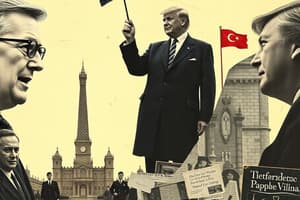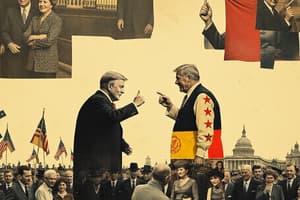Podcast
Questions and Answers
What is the main goal of political parties?
What is the main goal of political parties?
- To advocate for specific interests of their members
- To conduct public opinion polls
- To promote political socialization among citizens
- To gain control of government and influence public policy (correct)
Which type of interest group advocates for issues that benefit the general public?
Which type of interest group advocates for issues that benefit the general public?
- Public interest groups (correct)
- Commercial interest groups
- Private interest groups
- Political parties
What does the term 'margin of error' refer to in public opinion polling?
What does the term 'margin of error' refer to in public opinion polling?
- The degree of variation from the true value (correct)
- The total number of people surveyed
- The likelihood of bias in the sample selection
- The influence of the wording of questions
Which sampling method involves dividing the population into subgroups before sampling?
Which sampling method involves dividing the population into subgroups before sampling?
What is political socialization primarily influenced by?
What is political socialization primarily influenced by?
Citizens United is significant because it allowed what?
Citizens United is significant because it allowed what?
What is a 'stump speech'?
What is a 'stump speech'?
What characterizes free riders in the context of interest groups?
What characterizes free riders in the context of interest groups?
What is the primary purpose of Super PACs?
What is the primary purpose of Super PACs?
Which statement best describes voter suppression?
Which statement best describes voter suppression?
What does the pluralist theory of interest group formation suggest?
What does the pluralist theory of interest group formation suggest?
What is a presidential mandate?
What is a presidential mandate?
What is the primary role of media in a democratic society?
What is the primary role of media in a democratic society?
How do grassroots campaigns primarily engage voters?
How do grassroots campaigns primarily engage voters?
What is disturbance theory in the context of interest groups?
What is disturbance theory in the context of interest groups?
What is the main task of political parties during the nomination process?
What is the main task of political parties during the nomination process?
Which type of primary election allows any registered voter to participate, regardless of their party affiliation?
Which type of primary election allows any registered voter to participate, regardless of their party affiliation?
What is the term for the tendency for a popular political leader to attract votes for other candidates of the same party in an election?
What is the term for the tendency for a popular political leader to attract votes for other candidates of the same party in an election?
Which Supreme Court case established the "clear and present danger" standard for restricting free speech?
Which Supreme Court case established the "clear and present danger" standard for restricting free speech?
Which of these organizations is a powerful advocacy group for gun rights?
Which of these organizations is a powerful advocacy group for gun rights?
What type of election occurs halfway through a president's term, where congressional and other local officials are elected?
What type of election occurs halfway through a president's term, where congressional and other local officials are elected?
Which of these polling methods tracks changes in public opinion over time?
Which of these polling methods tracks changes in public opinion over time?
Which Supreme Court case affirmed students' rights to free speech in public schools?
Which Supreme Court case affirmed students' rights to free speech in public schools?
Which of these is an environmental organization focused on conservation and promoting green policies?
Which of these is an environmental organization focused on conservation and promoting green policies?
Which amendment lowered the voting age in the United States from 21 to 18?
Which amendment lowered the voting age in the United States from 21 to 18?
What is the main reason why third parties struggle to gain traction in the United States?
What is the main reason why third parties struggle to gain traction in the United States?
What is the difference between an initiative and a referendum?
What is the difference between an initiative and a referendum?
Which of these practices helps a candidate gain more influence in the candidate selection process?
Which of these practices helps a candidate gain more influence in the candidate selection process?
What is the main difference between the popular vote and the electoral college vote in presidential elections?
What is the main difference between the popular vote and the electoral college vote in presidential elections?
What is the key characteristic of a 'divided government'?
What is the key characteristic of a 'divided government'?
Which amendment authorized the federal government to collect income tax?
Which amendment authorized the federal government to collect income tax?
What is the role of the Federal Election Commission (FEC)?
What is the role of the Federal Election Commission (FEC)?
what is incumbency?
what is incumbency?
Flashcards
Interest groups
Interest groups
Organizations that aim to influence government policies to benefit their members or causes.
Random sampling
Random sampling
A method of randomly selecting individuals from a population, ensuring everyone has an equal chance of being chosen.
Public opinion polls
Public opinion polls
Surveys used to measure public opinion on various topics, typically using representative sampling and scientific methods.
Political socialization
Political socialization
Signup and view all the flashcards
Liberal political ideology
Liberal political ideology
Signup and view all the flashcards
Conservative political ideology
Conservative political ideology
Signup and view all the flashcards
Referendum
Referendum
Signup and view all the flashcards
Initiative
Initiative
Signup and view all the flashcards
Super PACs
Super PACs
Signup and view all the flashcards
Voter registration
Voter registration
Signup and view all the flashcards
Voter suppression
Voter suppression
Signup and view all the flashcards
Media bias
Media bias
Signup and view all the flashcards
Presidential mandate
Presidential mandate
Signup and view all the flashcards
Role of states in elections
Role of states in elections
Signup and view all the flashcards
Grassroots campaigning
Grassroots campaigning
Signup and view all the flashcards
Disturbance theory
Disturbance theory
Signup and view all the flashcards
What is a Single-Member District system?
What is a Single-Member District system?
Signup and view all the flashcards
What is a Proportional Representation system?
What is a Proportional Representation system?
Signup and view all the flashcards
What is frontloading in elections?
What is frontloading in elections?
Signup and view all the flashcards
How has presidential campaigning evolved?
How has presidential campaigning evolved?
Signup and view all the flashcards
What is the ERA / 28th Amendment debate about?
What is the ERA / 28th Amendment debate about?
Signup and view all the flashcards
What is the distinction between popular vote and electoral college vote?
What is the distinction between popular vote and electoral college vote?
Signup and view all the flashcards
What are term limits?
What are term limits?
Signup and view all the flashcards
Explain the concept of an initiative in government.
Explain the concept of an initiative in government.
Signup and view all the flashcards
Midterm elections
Midterm elections
Signup and view all the flashcards
Electoral College
Electoral College
Signup and view all the flashcards
NRA (National Rifle Association)
NRA (National Rifle Association)
Signup and view all the flashcards
Sierra Club
Sierra Club
Signup and view all the flashcards
Winner-take-all elections
Winner-take-all elections
Signup and view all the flashcards
Closed primaries
Closed primaries
Signup and view all the flashcards
Open primaries
Open primaries
Signup and view all the flashcards
Run-off elections
Run-off elections
Signup and view all the flashcards
Study Notes
Political Parties and Interest Groups
- Political parties aim to control government, implement policies, and influence public policy
- Interest groups seek to influence public policy to benefit members or causes
- Public interest groups advocate for general public issues
- Private interest groups advocate for specific member interests
- Free riders benefit from resources without contributing
- Public opinion polls survey public views on topics, aiming for accuracy through representative sampling
Public Opinion Polls
- Pollsters conduct opinion polls
- Margin of error indicates the range of true value estimations
- Sampling error arises from using samples instead of entire populations, leading to sample inaccuracies
- Random sampling gives each individual an equal chance of selection
- Stratified sampling divides populations into subgroups for more accurate sampling
Political Ideology
- Liberal ideology favors social equality, government intervention, and progressive social policies
- Conservative ideology supports limited government, free markets, and traditional social values
- Political socialization shapes political beliefs through factors like family, education, and media
Elections and Campaigns
- Referendum involves direct votes on proposals
- Initiative allows citizens to propose legislation
- Population of cases refers to all individuals being studied
- Citizens United allows unlimited corporate spending in elections
- Super PACs raise and spend unlimited amounts to influence elections
- Voter registration is the process for eligible voters to sign up
- Voter suppression discourages certain groups from voting
- Media bias occurs when journalists display partiality in news
- Presidential mandate suggests broad support for a president's policies
- States oversee elections
- Grassroots campaigning involves direct citizen engagement
- Interest groups represent different interests, fostering participation in a democracy
- Disturbance theory explains interest group formation in response to political changes
- Pluralist theory states interest groups naturally reflect societal diversity
- Organization structures within parties include leadership, committees, and memberships
- Candidate nominations involve selection processes by political parties
- Media bias refers to media partiality in news reporting
- Media's role includes information provision, public opinion shaping, and government accountability
- Daily news cycle encompasses the 24-hour timeframe for news production and consumption
- Voter preferences/choices exhibit patterns over time
- SMD and PR systems define electoral district representation
- Frontloading prioritizes early primary elections to influence candidate selection
- Presidential campaign strategies show changes in emphasis from face-to-face interactions to media use
- ERA/28th Amendment debate discusses gender equality
- Popular vote vs. electoral college vote highlights differing ways of counting votes
- Term limits restrict elected officials' maximum service periods
- Initiatives and referendums allow citizens to propose or approve legislation
- FEC enforces campaign finance regulation
- Third parties face challenges due to system factors
- 26th, 16th, 17th, and 12th amendments discuss voting rights, taxation, and presidential elections
- Divided government occurs when different political parties control different government branches
- Realignment signifies major changes in voter loyalties within electoral systems
- Primary elections select candidates for general elections
- Midterm elections occur halfway through a presidential term
Additional Concepts
-
Closed primaries limit voting to registered party members.
-
Open primaries allow any voter to participate
-
Run-off elections are held if no candidate wins a majority initially
-
Supreme Court cases like NY Times vs. US, Tinker v. Des Moines, Hazelwood v. Kuhlmeier, Schenck v. United States address freedom of speech and related topics
-
Coattails refer to the increased voting for a candidate's entire party based on their popularity
-
Redistricting adjusts electoral district boundaries for population changes
-
Reapportionment reallocates seats in the House based on population
-
Incumbency advantage benefits existing officeholders
-
Tracking polls track public opinion changes over time
-
American National Election Studies gather data on political behaviors
-
Exit polls gauge public opinion immediately after elections
-
Push polls use misleading tactics to influence voters
Studying That Suits You
Use AI to generate personalized quizzes and flashcards to suit your learning preferences.
Related Documents
Description
Test your knowledge on political parties, interest groups, and public opinion polls. This quiz covers key concepts, definitions, and methodologies related to the influence of these entities on policy and governance. Dive into the nuances of political ideologies and their implications.




